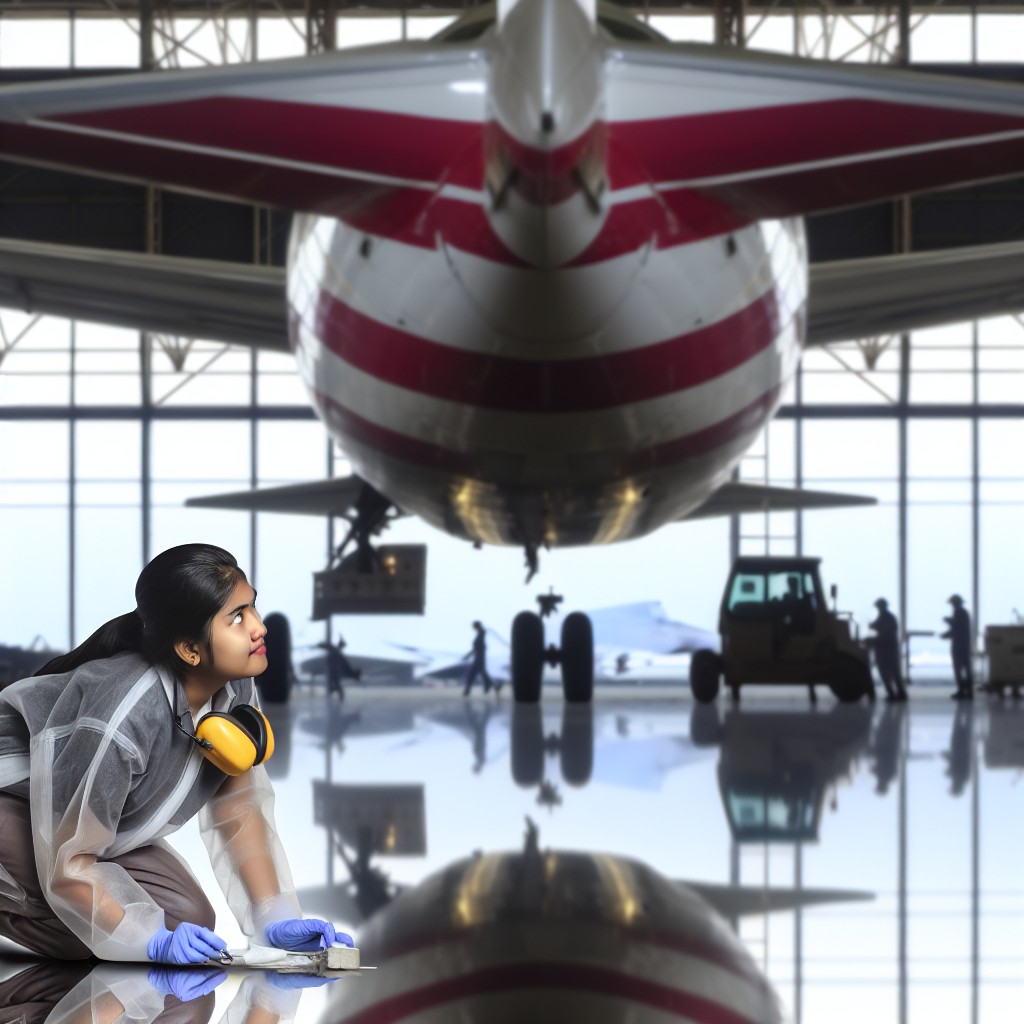Introduction:
Aviation maintenance technicians play a crucial role in ensuring the safety and efficiency of aircraft operations.
They are responsible for inspecting, repairing, and maintaining aircraft to ensure they meet regulatory standards.
Discussing salary expectations in the field of aviation maintenance technicians is important as it helps professionals and job seekers understand the potential earnings and benefits of pursuing a career in this field.
This information can help individuals make informed decisions about their career paths and negotiate fair compensation for their skills and expertise.
When it comes to entry-level aviation maintenance technicians, the average salary can vary depending on several factors.
Let’s explore the range of salaries and the influences on these pay rates:
Range of Salaries for Entry-Level Technicians
Entry-level aviation maintenance technicians can expect to earn an average salary of $38,000 to $50,000 per year.
This range may fluctuate based on several factors.
Factors Affecting Entry-Level Salaries
- Location: The geographical location of the job plays a significant role in determining pay rates.
- Type of Employer: The type of employer can also impact an entry-level technician’s salary.
- Experience and Education: While entry-level technicians may not have extensive experience, those with additional certifications or specialized training may command higher salaries.
- Demand for Technicians: The demand for aviation maintenance technicians can influence entry-level salaries.
- Benefits and Perks: In addition to base salaries, entry-level technicians should consider other benefits and perks offered by employers.
Overall, entry-level aviation maintenance technicians can expect a competitive salary range as they embark on their careers.
By considering the factors mentioned above, technicians can make informed decisions regarding job opportunities and compensation packages.
Mid-Career Salary Expectations
Aviation maintenance technicians with a few years of experience can expect a typical salary range that reflects their expertise and dedication to the field.
As technicians gain more experience and expertise in the aviation maintenance field, they open themselves up to a variety of opportunities for advancement and salary growth.
- Increased responsibilities can lead to higher pay rates as technicians demonstrate their skills and knowledge in maintaining and repairing aircraft.
- Technicians who pursue additional certifications or specialize in specific areas of aircraft maintenance may command higher salaries due to their specialized expertise.
- Opportunities for advancement within the aviation industry, such as moving into supervisory roles or working for larger airlines, can also result in higher salary potential for mid-career technicians.
- Networking within the aviation maintenance community can also open doors to higher-paying job opportunities as technicians build a reputation for quality work and reliability in the field.
Uncover the Details: Transportation Analyst: Essential Soft Skills
Specialization and Salary Potential
Specializing in a specific area of maintenance can significantly impact aviation maintenance technicians’ salary expectations.
By honing their skills in a particular field, technicians can become valuable assets to their employers and demand higher pay.
High-Demand Specializations within the Aviation Maintenance Industry
- Avionics Technician: Avionics technicians specialize in the electrical systems of aircraft, including navigation, communication, and in-flight entertainment systems. Due to the complex nature of avionics systems, technicians with this specialization are in high demand.
- Engine Mechanic: Engine mechanics focus on the maintenance and repair of aircraft engines. With advancements in engine technology and the need for meticulous attention to detail, engine mechanics are essential to keeping aircraft in optimal condition.
- Structural Repair Technician: Structural repair technicians specialize in repairing and maintaining the structural components of aircraft, such as the fuselage, wings, and tail. Their expertise is crucial for ensuring the structural integrity and safety of aircraft.
- Composites Technician: Composites technicians work with advanced materials, such as carbon fiber, to repair and fabricate components for aircraft. As the aviation industry increasingly uses composite materials for their lightweight and durable properties, technicians with this specialization are highly sought after.
- Quality Control Inspector: Quality control inspectors are responsible for ensuring that all maintenance tasks meet regulatory standards and manufacturer specifications. Their attention to detail and commitment to upholding safety protocols make them indispensable professionals in the aviation maintenance industry.
Specializing in a high-demand area of aviation maintenance can position technicians for greater earning potential and career advancement opportunities.
By focusing on developing expertise in specific niches within the industry, technicians can set themselves apart and command higher salaries based on their specialized skills and knowledge.
See Related Content: Logistics Consultant: Tips for Remote Consulting
Factors Influencing Salary Negotiations
When it comes to negotiating your salary as an aviation maintenance technician, there are several factors that can influence the final amount you agree upon.
Understanding these factors can help you navigate the negotiation process effectively.
Transform Your Career Today
Unlock a personalized career strategy that drives real results. Get tailored advice and a roadmap designed just for you.
Start NowImportance of Considering Additional Benefits, Such as Healthcare and Retirement Plans
- Benefits can significantly impact the overall compensation package you receive.
- Healthcare coverage and retirement plans are crucial considerations for long-term financial stability.
- Employers may offer different benefits packages, so it’s essential to weigh these options during negotiations.
- Be sure to consider the value of benefits alongside the base salary when evaluating job offers.
How Experience and Certifications Can Impact Salary Negotiations
- Experience plays a significant role in determining your earning potential as an aviation maintenance technician.
- Technicians with more years of experience typically command higher salaries due to their specialized knowledge and skills.
- Certifications, such as an A&P license, can also lead to increased earning potential in the aviation industry.
- Employers often place value on certifications as they demonstrate proficiency and expertise in the field.
- Having a combination of experience and relevant certifications can strengthen your position during salary negotiations.
Delve into the Subject: Importance of Supply Chain Analytics in E-commerce
Industry Trends and Pay Increases
Current trends in the aviation maintenance industry play a significant role in determining salaries.
Technological advancements in aircraft maintenance can lead to higher salaries for skilled technicians.
Increased demand for aviation maintenance technicians due to an expanding industry can also result in higher pay.
Government regulations and safety standards may impact the salaries of aviation maintenance technicians.
Market competition and the overall economic climate can influence salary trends in the aviation maintenance industry.
How to stay updated on industry changes
Joining professional associations related to aviation maintenance can help you stay informed about industry trends.
Attending industry conferences, workshops, and seminars can provide valuable insights into salary expectations.
Participating in online forums and networking events can connect you with industry professionals who can share salary insights.
Subscribing to industry publications and newsletters can keep you up to date on the latest trends affecting aviation maintenance salaries.
Regularly checking job boards and salary surveys specific to the aviation maintenance field can help you understand current pay rates.
You Might Also Like: Distribution Manager’s Guide to Supply Chain Integration

Geographical Variances in Salary
In the field of aviation maintenance, salaries can vary significantly based on location.
Various factors contribute to these differences, including the cost of living in a particular area and the demand for skilled technicians.
It is essential for aviation maintenance technicians to understand these geographical variances in salary to make informed decisions about their career paths.
Variations in Salaries Based on Location
One of the primary reasons for geographical variances in salary for aviation maintenance technicians is the cost of living in different regions.
Technicians working in metropolitan areas or high-cost cities may command higher salaries to offset the increased expenses associated with living in these locations.
On the other hand, those working in rural or lower-cost regions may receive lower salaries.
Additionally, the demand for aviation maintenance technicians in a particular location can also impact salary levels.
Regions with a strong aviation industry presence and a high volume of aircraft maintenance work are likely to pay technicians more competitively to attract and retain top talent.
Transform Your Career Today
Unlock a personalized career strategy that drives real results. Get tailored advice and a roadmap designed just for you.
Start NowConversely, areas with limited aviation activity may offer lower salaries due to decreased demand for technicians.
Strategies for Researching Average Salaries in Different Regions
Before pursuing a career as an aviation maintenance technician, it is crucial to research average salaries in different regions to understand the earning potential in various locations.
Here are some strategies for conducting this research:
- Utilize online resources: Websites such as Glassdoor, Indeed, and PayScale provide valuable insights into average salaries for aviation maintenance technicians in different regions.
- Consult industry associations: Organizations like the Aircraft Mechanics Fraternal Association (AMFA) and the Aerospace Industries Association (AIA) may offer salary surveys or reports that highlight regional salary variations.
- Network with industry professionals: Connecting with current or former aviation maintenance technicians working in various regions can provide firsthand knowledge about salary trends.
- Consider cost of living factors: When researching average salaries, it is essential to consider the cost of living in each region.
- Consult with recruiters or staffing agencies: Recruiters specializing in aviation maintenance roles may have access to salary data for different regions and can provide guidance on market rates.
By employing these strategies and conducting thorough research, aviation maintenance technicians can gain valuable insights into geographical variances in salary.
This information will empower technicians to make informed decisions about their career paths and negotiate competitive compensation packages based on their desired location and industry preferences.
Professional Development and Salary Growth
Professional development is a key factor in determining the salary growth of aviation maintenance technicians.
Continuing education plays a crucial role in enhancing skills and knowledge.
This is directly linked to increased earning potential in this field.
Aviation maintenance technicians who invest time and effort in obtaining additional certifications often see a significant bump in their salaries.
Employers value employees who are committed to continuous learning and improving their abilities.
They are willing to reward them with higher pay.
Moreover, there are ample opportunities for advancement within the aviation maintenance field.
Technicians who demonstrate leadership qualities, problem-solving skills, and a strong work ethic are often promoted to supervisory or management positions.
These roles come with higher salaries.
Advancement in the aviation maintenance field can also lead to specialized roles that command higher pay.
For example, technicians who become certified in avionics systems or aircraft engines can expect to earn more than their counterparts who have not pursued such specialized training.
It is important for aviation maintenance technicians to stay updated on industry trends and technologies to remain competitive in the job market.
By continuously improving their skills and expertise, technicians can position themselves for salary growth and advancement opportunities.
- Importance of continuing education for salary growth.
- Obtaining additional certifications can boost earnings.
- Opportunities for advancement in aviation maintenance field.
- Advancement can lead to higher salaries.
Salary Expectations for Aviation Maintenance Technicians
After discussing the salary expectations for aviation maintenance technicians, it is clear that the industry offers competitive pay based on experience and certifications.
It is important for aviation maintenance technicians to research average salaries in their region and negotiate for fair compensation.
Transform Your Career Today
Unlock a personalized career strategy that drives real results. Get tailored advice and a roadmap designed just for you.
Start NowBy understanding their worth and advocating for themselves, aviation maintenance technicians can ensure they are being properly compensated for their skills and expertise.
Aviation maintenance technicians play a crucial role in the safety and reliability of aircraft. They should not hesitate to seek fair wages for their valuable contributions.
Additional Resources
Job Opportunities – SPD – State of Alabama Personnel Department
Enlistment Bonuses by Position | Navy.com
[E-Books for Sale]
The Big Book of 500 High-Paying Jobs in America: Unlock Your Earning Potential
$19.99 • 500 High-Paying Jobs • 330 pages
Explore 500 high-paying jobs in America and learn how to boost your career, earn more, and achieve success!
See All 500 High-Paying Jobs of this E-Book
1001 Professions Without a Degree: High-Paying American Jobs You Can Start Now
$19.99 • 1001 Professions Without a Degree • 174 pages
Discover 1001 high-paying jobs without a degree! Unlock career tips, skills, and success strategies for just $19.99!




